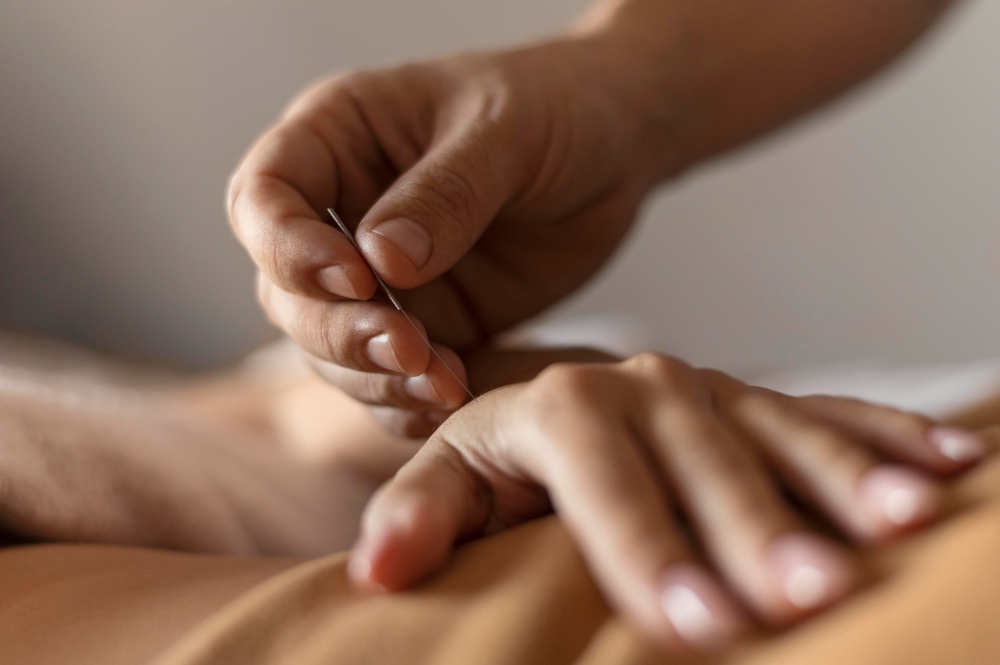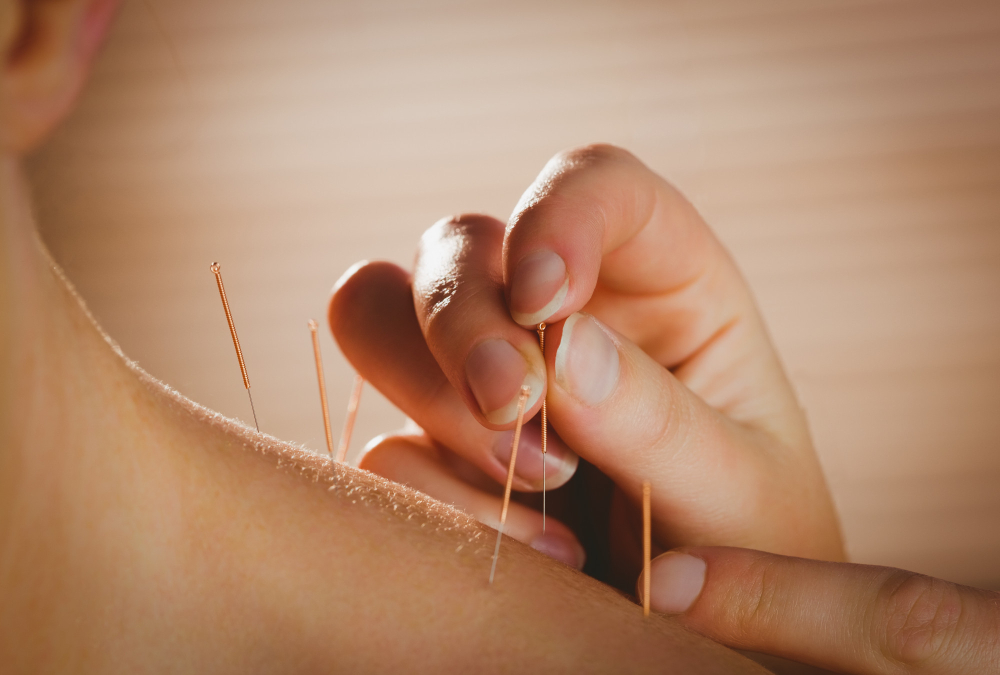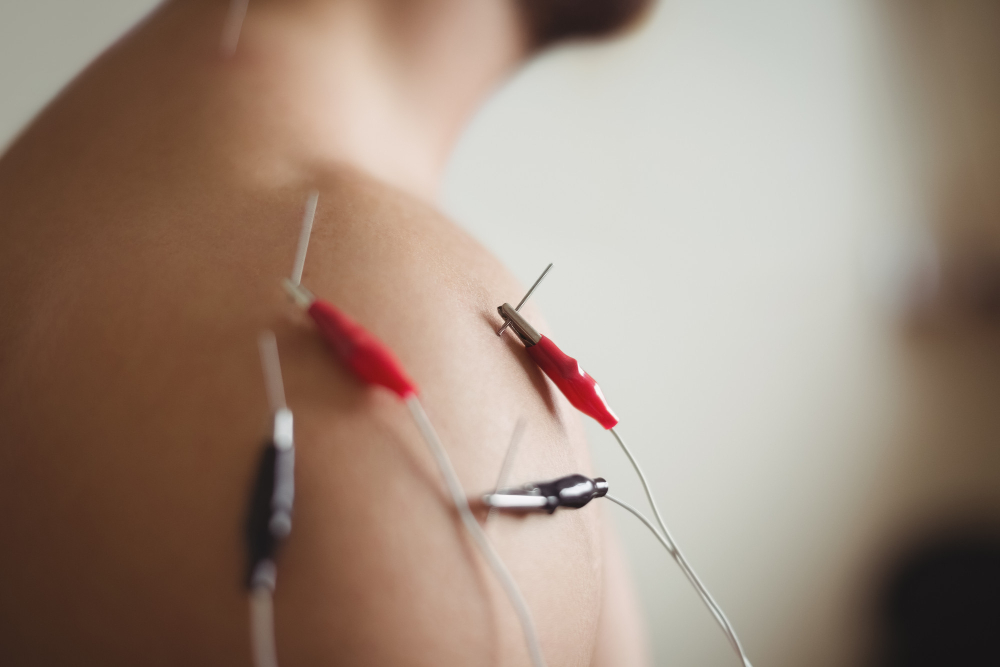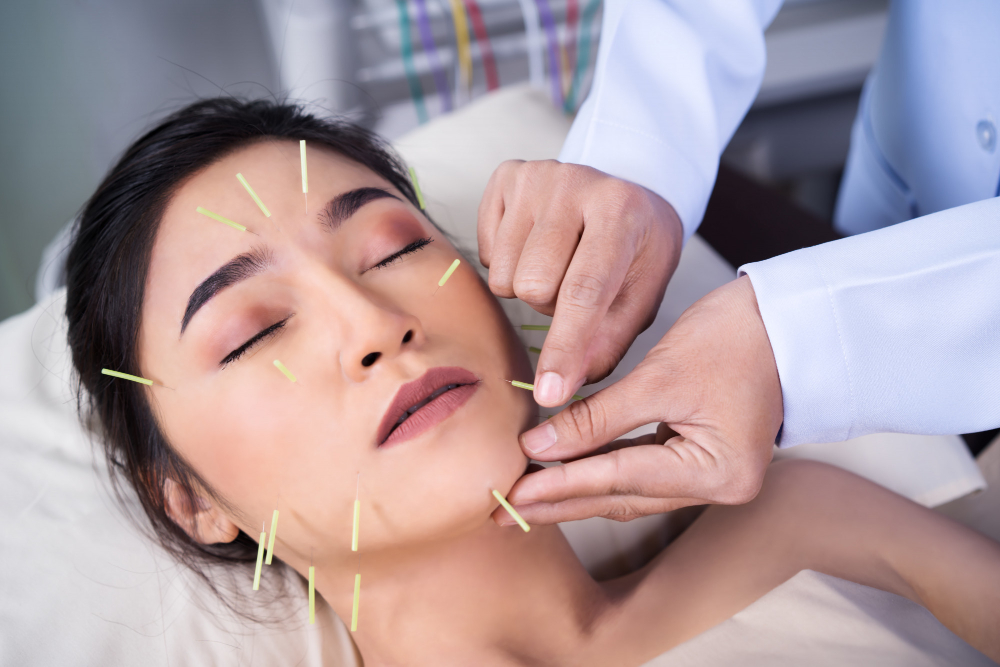Acupuncture

Acupuncture involves inserting very thin needles into specific points on the body. This is done to manipulate the body's flow of energy to help stimulate healing and promote well-being.
According to TCM or Traditional Chinese Medicine, health is a result of a harmonious balance of the complementary extremes of yin and yang, and illness is said to be the consequence of an imbalance.
The body's vital energy, or qi, is believed to flow along specific pathways, known as meridians, and it's these pathways that acupuncturists target during treatments.
Benefits
Numerous medical disorders are treated by acupuncture. Below mentioned are some potential benefits of acupuncture.
- Pain Reduction: Numerous types of pain can be treated with acupuncture, including menstrual cramps, headaches, and even chronic back pain.
- Stress & Anxiety Reduction: Acupuncture may help reduce stress and anxiety. By regulating the body's nervous system, the production of stress hormones is decreased.
- Improved Sleep: Some people use acupuncture to help with insomnia or other sleep issues. By promoting relaxation and regulating the release of certain neurotransmitters, acupuncture may help improve sleep quality.
- Digestive Health: Acupuncture can be used to help regulate the digestive system and address various digestive-related issues.
- Allergy Relief: Acupuncture can help reduce symptoms potentially by boosting the immune system's response to allergens.
- Help with Quitting Smoking: Some people use acupuncture as part of a comprehensive program to help quit smoking or to deal with other addictions.
- Cancer Care: Acupuncture can be used to assist manage adverse effects associated with cancer treatment induced by chemotherapy or radiotherapy.
Fertility Enhancement: Some research suggests that, when used alongside conventional fertility treatments, acupuncture may help by increasing blood flow to the uterus, balancing hormones, and reducing stress.

Acupuncture is generally considered safe when performed by an experienced, competent practitioner using sterile needles. However, there are potential risks and side effects to be aware of:
- Minor Bleeding or Bruising: Where the needles puncture the skin, minor bleeding or bruising may occur.
- Soreness: After the acupuncture session, some people might feel soreness or slight pain at the needle insertion points.
- Infection: While rare, infections can occur if the needles are not sterile, which is why it's essential to ensure your practitioner uses single-use disposable needles.
- Injury: If the acupuncturist isn't well-trained and punctures too deeply, it can cause injury to underlying organs or tissues. This is extremely rare, particularly with practitioners who have proper training
- Adverse Reactions: Some people may feel lightheaded or faint during or after acupuncture. In rare instances, people can have more serious reactions like nerve damage or a punctured lung, but these are extremely unlikely with a trained practitioner.
- Interactions with Medications or Other Treatments: In some cases, acupuncture might interfere with certain medications or other treatments, particularly in the case of blood thinners.
- Unsuitable for Some People: People with bleeding disorders or who are taking blood thinners should check with their doctors before undergoing acupuncture. Similarly, pregnant women should use caution, as certain acupuncture points can stimulate labor.

Here is what you may typically expect from an acupuncture treatment.
- Initial Consultation: The acupuncturist will go through your medical background, present symptoms, and any potential problems with you at your initial session. This information helps them create a personalized treatment plan.
- Examination & Diagnosis: The acupuncturist may examine your tongue, pulse, and palpate specific areas to assess your overall health and identify any imbalances in your body's energy (qi). They will use this diagnosis to determine the acupuncture points that need stimulation.
- Treatment Plan: The course of treatment is outlined, including how many sessions and how frequently they should be scheduled. Treatment plans vary depending on the condition being addressed and the individual's response to acupuncture.
- Treatment Session: During the treatment, you will lie on a comfortable table. The acupuncturist will use sterile, thin needles and insert them into specific acupuncture points on your body. The needles are typically left in place for 10 to 30 minutes while you relax.
- Needle Sensation: When the needles are implanted, you could feel different things, such as a dull soreness, a tiny sting, or tingling. These sensations are generally mild and temporary.
- Relaxation & Rest: Many people find acupuncture sessions relaxing and may feel a sense of calmness or even fall asleep during the treatment. Soft music or dim lighting may be used to enhance relaxation.
- Needle Removal: The acupuncturist will take out the needles when the right amount of time has passed. This is usually painless and quick.
- Post-Treatment Discussion: After the session, the acupuncturist may discuss your experience, answer any questions, and provide recommendations for self-care, such as lifestyle modifications or herbal remedies.
- Follow-Up Sessions: Depending on your condition, multiple acupuncture sessions may be required. The acupuncturist will take out the needles when the right amount of time has passed.

When To Call The Doctor
Below are some instances when you should consider reaching out to a doctor.
- Severe Pain or Discomfort: It's crucial to get medical help if you suffer more severe or enduring discomfort during or after an acupuncture treatment than you anticipated.
- Excessive Bleeding or Bruising: While minimal bleeding or bruising at the needle insertion sites is normal, if you notice excessive bleeding or bruising that concerns you, it is advisable to contact a healthcare professional.
- Infection Signs: It's crucial to get medical help if you have symptoms of infection such as increasing pain, redness, swelling, warmth, or discharge at the needle insertion sites.
- Worsening Symptoms or New Complications: If your symptoms worsen or new complications arise after acupuncture treatment, it is best to reach out to a healthcare professional for further evaluation.
- Allergic Reactions: Even though allergic reactions are uncommon, it is crucial to get medical help right away if you develop any symptoms including breathing difficulties, hives, or facial, lip, tongue, or throat swelling.

